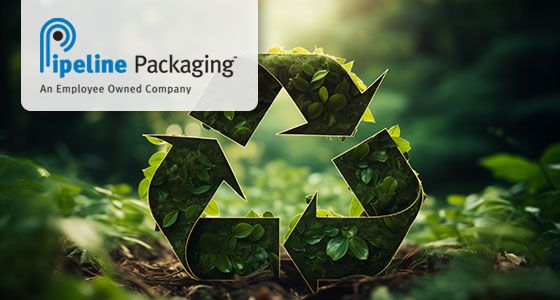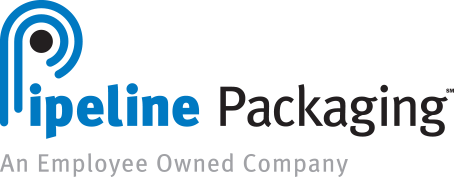While recycled packaging won’t work for every customer in every industry, our team of Good People at the Core is consistently on the lookout for new opportunities and technologies. Sustainable, recycled packaging can be a cost-effective and efficient strategy to help decrease a company’s carbon footprint.
Pipeline Packaging built a solid reputation by offering the perfect combination of packaging products and value-added services. Plus, we take direct ownership for delivering success for our customers every day.
Recycled packaging technologies and strategies are just some of the many ways Pipeline can help make your order more eco-friendly:
- Use polyethylene terephthalate (PET) and recycled PET (rPET) plastics whenever possible;
- Reduce virgin material content in favor of post-consumer resin (PCR);
- Reduce gram weight to decrease fuel/energy consumption and material waste;
- Utilize more uncoated corrugate packaging whenever possible;
- Reduce products with a high water content to a concentrate to decrease package size and weight;
- Use packaging/palletizing designs that maximize the number of containers per shipment; and
- Consider the use of reconditioned packaging, such as drums and IBC totes.
Your Pipeline Packaging representative will work closely with you to determine which recycled packaging technologies will work for your operation as well as the best way to make your packaging as eco-friendly as possible.
PET Plastics: America’s Most Recycled Material

According to the American Beverage Association, PET is a type of clear, durable, and versatile plastic. It’s the most recyclable and recycled plastic in the U.S. America’s beverage companies use it to make beverage bottles, which are designed to be 100% recyclable.
rPET is a highly sought-after technology. Using rPET rather than new plastic significantly reduces your environmental impact. When used to make new bottles, total energy consumption is reduced by 79%, and greenhouse gas emissions are limited by 67%. rPET can even be used to make new bottles as well as many other products, including winter jackets, rugs, playground equipment, dog beds, and more.
PCR Plastic: Meeting the Market with Recyclables
PCR is an environmentally friendly packaging option that many manufacturers use to support recycling technologies and the impact on landfills while keeping up with consumer demands.
PCR plastics are the recycled materials from PET bottles and other plastics. These materials are recycled into other packaging through community recycling programs. An estimated 30 billion bottles of water are sold annually across the U.S., so there’s a real need to increase the usage of PCR materials to make new products.
The Association of Plastic Recyclers works diligently to increase demand for these PCR plastic products across North America.
Why Recycled Packaging Technologies, Why Now?
Two forces have joined to create a significant increase in the interest of packaging recycling. On one hand, growing awareness for sustainability initiatives has led businesses and consumers to go green with their everyday decisions — including packaging.
The other driving force behind recycled technologies is the recent rise in regulation and legislation. In the U.S., a growing number of states have instituted PCR minimums that require certain percentages of recycled materials in every packaging product. These thresholds are typically enforced with expected percentage increases after a set number of years.
The Explosion in Recycling Technologies
As the packaging expert, Pipeline stays up to speed on today’s advanced recycling technologies and legislative actions to ensure a healthy inventory that meets customer needs. Let’s catch you up to speed on the latest movements coming out of the advanced recycling world.
Traditional recycling is known as mechanical recycling. This method processes plastics into renewed materials without disrupting its molecular structure. However, progress within advanced recycling technologies, also referenced as chemical or molecular recycling, has opened the door to new possibilities.
For instance, purification is an advanced recycling practice that uses polymer technology to remove colors and odors from plastics. By removing additives and certain contaminants, the packaging is cleansed, or “purified,” for future use.
Another advanced recycling method, depolymerization, breaks down a plastic’s polymers into monomers. These monomers are then put back together to form a new plastic material.
The most intensive of the recycled packaging technologies is conversion. Like depolymerization, it occurs at the polymer level. Using gasification or paralysis, conversion breaks down plastic polymers and brings them back to the original raw material. From there, it can be reused to create other plastics.
Ready to Go Green?
There’s no doubt these recycling technologies are the future of sustainable packaging. By renewing plastics at the chemical level, a sea of options has emerged, and as the offerings have increased, the carbon footprints have decreased. These promising methods of purification, depolymerization, and conversion have proven their abilities to reduce waste and build efficiency, all the while producing stronger plastics than previous recycling processes.
Still, these advanced recycled technologies have experienced some difficulties. For example, as the latest innovations within the market, these methods are only occurring on a small scale. As a result, products recycled using chemical or molecular processes can be more expensive than virgin or other sustainable products.
Recycled packaging technologies are also limited in their applications. Certain industries, like healthcare, food and beverage, and certain chemical functions, require virgin materials due to either regulatory or sanitary standards.
Jennifer Bodin has worked for Pipeline Packaging as an outside sales representative for over a decade. One customer within her service region, a pharmaceutical manufacturer in the animal healthcare industry, knows these limitations firsthand.
“As a specialist in creating oral solutions for a variety of animals, the manufacturer is required by the FDA to use virgin materials for every packaging component — from the primary bottle to sprayers to droppers and caps,” said Bodin
Making any change to its existing packaging systems can also be a challenge.
“Any adjustments or changes must be approved by the FDA,” she added. “It’s a lengthy and costly process. At Pipeline, we’re committed to walking through that process with them. We conduct our own sampling, quality assurance, and internal testing before the customer submits an approval application to the FDA.”
Despite regulations, specific products offered by the veterinary healthcare customer also require packaging with fluorinated coatings to prevent the stored chemicals from eating away at the container. Even with the impressive advances in recycled technologies, chemical coatings still prevent certain products from ever being recycled.
All that being said, Bodin expects new processes and technologies to ultimately impact the animal healthcare industry and many others moving forward.
From Virgin to Recycled, Pipeline Packaging has you Covered
At Pipeline Packaging, we provide the perfect comprehensive packaging solutions with a vast inventory supplied using our network of more than 400 global suppliers, along with a complete list of value-added services meant to make packaging as seamless as possible for customers. Part of maintaining that commitment to our customers and their needs requires a deeper awareness of packaging trends and technologies.
Though advanced recycled technologies like purification, depolymerization, and conversion remain small-scale, they hold the potential for immense growth within the sustainable packaging sector. As we watch these innovations continue to develop, our packaging specialists will continue sourcing the highest-quality packaging from sustainable options like rPET and PCR products to virgin materials, to meet every customer’s individual needs.
Considering a switch to more sustainable and recycled packaging? Contact us today to learn how you can incorporate recycled technologies and eco-friendly plastics into your operation.


